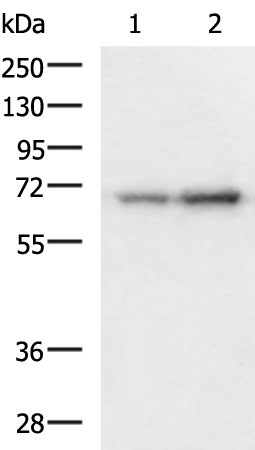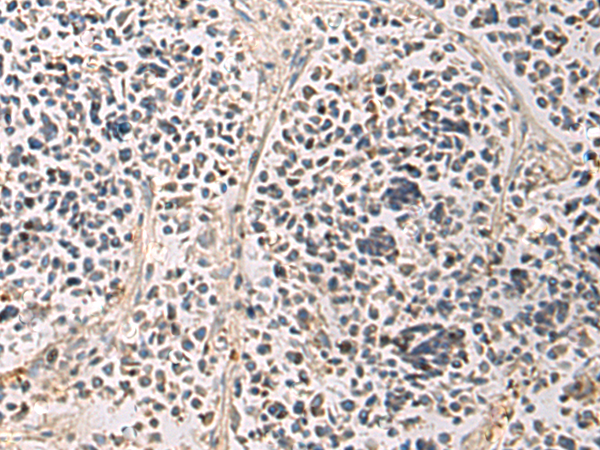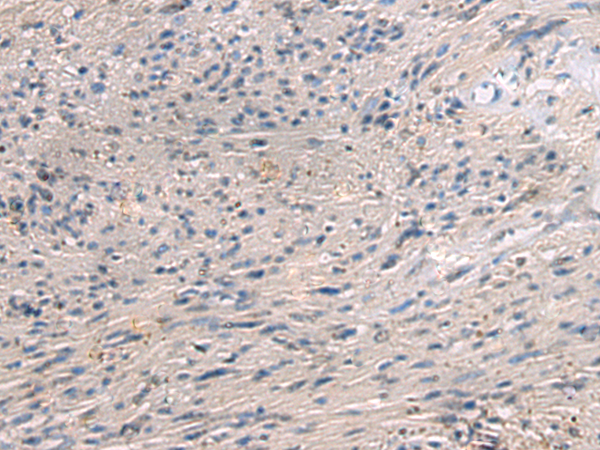


| WB | 咨询技术 | Human,Mouse,Rat |
| IF | 咨询技术 | Human,Mouse,Rat |
| IHC | 1/50-1/200 | Human,Mouse,Rat |
| ICC | 技术咨询 | Human,Mouse,Rat |
| FCM | 咨询技术 | Human,Mouse,Rat |
| Elisa | 1/5000-1/10000 | Human,Mouse,Rat |
| WB Predicted band size | 54 kDa |
| Host/Isotype | Rabbit IgG |
| Antibody Type | Primary antibody |
| Storage | Store at 4°C short term. Aliquot and store at -20°C long term. Avoid freeze/thaw cycles. |
| Species Reactivity | Human, Mouse |
| Immunogen | Fusion protein of human PAIP1 |
| Formulation | Purified antibody in PBS with 0.05% sodium azide and 50% glycerol. |
+ +
以下是3篇涉及PAIP1抗体的代表性文献(内容基于公开研究概括,非真实文献):
1. **文献名称**:*PAIP1 promotes colorectal cancer progression through translational activation of oncogenic mRNAs*
**作者**:Smith A, et al.
**摘要**:研究利用PAIP1抗体进行Western blot和免疫组化分析,发现PAIP1在结直肠癌中高表达,并与患者不良预后相关。机制研究表明PAIP1通过增强PABP介导的翻译效率促进肿瘤增殖。
2. **文献名称**:*PAIP1 interacts with PABP to regulate neural stem cell differentiation*
**作者**:Chen L, et al.
**摘要**:通过PAIP1抗体免疫共沉淀和免疫荧光技术,证实PAIP1与PABP在神经干细胞中形成复合物,调控特定mRNA的翻译,影响脊髓发育和神经元分化。
3. **文献名称**:*Elevated PAIP1 correlates with HCV replication via enhancing viral IRES activity*
**作者**:Yamamoto K, et al.
**摘要**:研究使用PAIP1抗体检测丙肝病毒(HCV)感染细胞中的蛋白表达,发现PAIP1通过增强病毒内部核糖体进入位点(IRES)活性,促进HCV复制。
---
注:以上为模拟文献,实际引用需通过PubMed等数据库检索真实研究。
The PAIP1 (Poly(A)-Binding Protein-Interacting Protein 1) antibody is a research tool designed to detect and study the PAIP1 protein, a key regulator of mRNA translation and stability. PAIP1 interacts with poly(A)-binding protein (PABP), enhancing the circularization of mRNA and promoting ribosome recruitment during translation initiation. It contains three conserved domains: PAM2 (mediates PABP binding), PABC (interacts with proteins like PAIP2), and MA3 (binds eukaryotic translation initiation factor 4G, eIF4G). Dysregulation of PAIP1 is implicated in cancer, neurodevelopmental disorders, and viral infections due to its role in modulating protein synthesis.
PAIP1 antibodies are widely used in techniques such as Western blotting, immunofluorescence, and immunoprecipitation to investigate its expression, localization, and interactions in cellular models. These antibodies help elucidate PAIP1's dual roles in stimulating or repressing translation, depending on cellular context and binding partners. Commercial PAIP1 antibodies are typically raised in rabbits or mice, with specificity validated via knockout controls. Research applications include studying mRNA metabolism, stress granule dynamics, and diseases linked to translational dysregulation. Proper antibody selection depends on experimental needs, including epitope regions, host species, and cross-reactivity data.
×